新世纪的医师职业精神—医师宣言
医生宣言_精品文档

医生宣言作为医生,我们有着崇高的使命和责任,我们的目标是为患者提供最优质的医疗服务,保护和促进人类的健康。
在这个宣言中,我们郑重承诺遵守以下原则和价值观。
第一,我们将尊重、保护和维护患者的健康和尊严。
每个患者都是独一无二的个体,我们要尊重他们的权利和意愿。
我们将竭尽全力提供安全和高效的医疗服务,保障每位患者的隐私和匿名性。
我们将尽最大努力提供患者所需的信息和知情同意,协助他们做出明智的决策。
第二,我们将致力于不断提高自己的专业知识和技能。
医疗科技和知识在不断发展,我们必须与时俱进。
我们将不断学习、研究和实践,以提供最先进的医疗服务。
我们要建立和维护一个良好的团队合作和学习的环境,鼓励同事之间的知识分享和互相帮助。
第三,我们将对每个患者负责。
我们将尽力保证每位患者能够及时得到正确的诊断和治疗。
我们将遵循最佳的医疗实践和指南,确保治疗方案的科学性和有效性。
我们将在每个环节上都严格把关,避免错误和疏漏的发生。
同时,我们也将积极倾听患者的需求和意见,持续改进我们的服务。
第四,我们将保持谦卑和同情心。
作为医生,我们将面对许多病人的痛苦和困境,我们要用同情和理解代替冷漠和嘲笑。
我们将竭力减轻患者的痛苦,提供心理和情感支持。
我们要保持良好的沟通和倾听技巧,以便更好地了解患者的需求和关切。
第五,我们将遵循医德和伦理规范。
我们要保持良好的职业道德和操守,坚守实事求是和公正的原则。
我们要尊重和维护与患者、同事和其他卫生专业人员之间的互相信任和尊重关系。
我们将严格遵循个人数据保护和患者隐私的法律法规。
第六,我们将积极参与社区和全球的公共卫生事务。
我们要发挥领导和倡导的作用,参与教育和培训活动,提高人们对健康问题的认识和意识。
我们要参与公共卫生规划和政策的制定,为社区的健康和福祉做出积极贡献。
最后,我们承诺将以全心全意的奉献精神为患者服务,维护和促进人类的健康。
我们将不计个人的付出,始终追求更高的医疗水平和服务质量。
我们将时刻谨记我们的使命,无论在何时何地,都以医者仁心的态度对待每一位患者。
中国医师宣言
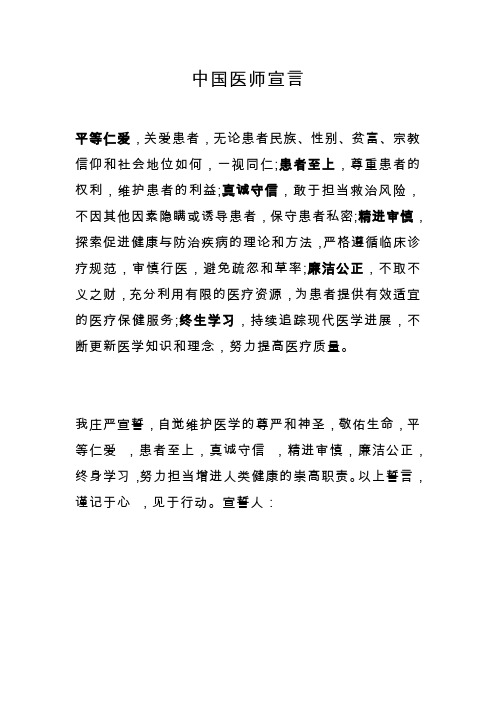
中国医师宣言
平等仁爱,关爱患者,无论患者民族、性别、贫富、宗教信仰和社会地位如何,一视同仁;患者至上,尊重患者的权利,维护患者的利益;真诚守信,敢于担当救治风险,不因其他因素隐瞒或诱导患者,保守患者私密;精进审慎,探索促进健康与防治疾病的理论和方法,严格遵循临床诊疗规范,审慎行医,避免疏忽和草率;廉洁公正,不取不义之财,充分利用有限的医疗资源,为患者提供有效适宜的医疗保健服务;终生学习,持续追踪现代医学进展,不断更新医学知识和理念,努力提高医疗质量。
我庄严宣誓,自觉维护医学的尊严和神圣,敬佑生命,平等仁爱,患者至上,真诚守信,精进审慎,廉洁公正,终身学习,努力担当增进人类健康的崇高职责。
以上誓言,谨记于心,见于行动。
宣誓人:。
医师宣言
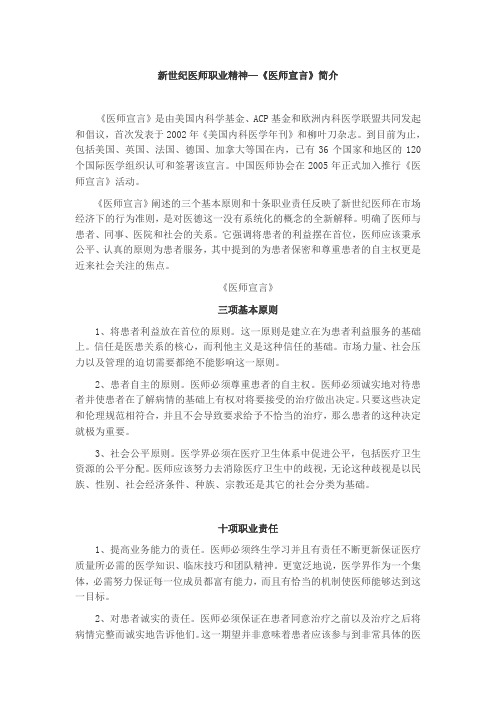
新世纪医师职业精神—《医师宣言》简介《医师宣言》是由美国内科学基金、ACP基金和欧洲内科医学联盟共同发起和倡议,首次发表于2002年《美国内科医学年刊》和柳叶刀杂志。
到目前为止,包括美国、英国、法国、德国、加拿大等国在内,已有36个国家和地区的120个国际医学组织认可和签署该宣言。
中国医师协会在2005年正式加入推行《医师宣言》活动。
《医师宣言》阐述的三个基本原则和十条职业责任反映了新世纪医师在市场经济下的行为准则,是对医德这一没有系统化的概念的全新解释。
明确了医师与患者、同事、医院和社会的关系。
它强调将患者的利益摆在首位,医师应该秉承公平、认真的原则为患者服务,其中提到的为患者保密和尊重患者的自主权更是近来社会关注的焦点。
《医师宣言》三项基本原则1、将患者利益放在首位的原则。
这一原则是建立在为患者利益服务的基础上。
信任是医患关系的核心,而利他主义是这种信任的基础。
市场力量、社会压力以及管理的迫切需要都绝不能影响这一原则。
2、患者自主的原则。
医师必须尊重患者的自主权。
医师必须诚实地对待患者并使患者在了解病情的基础上有权对将要接受的治疗做出决定。
只要这些决定和伦理规范相符合,并且不会导致要求给予不恰当的治疗,那么患者的这种决定就极为重要。
3、社会公平原则。
医学界必须在医疗卫生体系中促进公平,包括医疗卫生资源的公平分配。
医师应该努力去消除医疗卫生中的歧视,无论这种歧视是以民族、性别、社会经济条件、种族、宗教还是其它的社会分类为基础。
十项职业责任1、提高业务能力的责任。
医师必须终生学习并且有责任不断更新保证医疗质量所必需的医学知识、临床技巧和团队精神。
更宽泛地说,医学界作为一个集体,必需努力保证每一位成员都富有能力,而且有恰当的机制使医师能够达到这一目标。
2、对患者诚实的责任。
医师必须保证在患者同意治疗之前以及治疗之后将病情完整而诚实地告诉他们。
这一期望并非意味着患者应该参与到非常具体的医疗方案中去,而是指他们必须有权利对治疗做出决定。
中国医师誓言
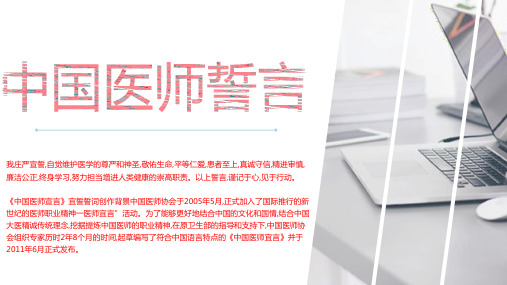
《中国医师宣言》宜誓誓词创作背景中国医师协会于2005年5月,正式加入了国际推行的新 世纪的医师职业精神一医师宜言”活动。为了能够更好地炼中国医师的职业精神,在原卫生部的指导和支持下,中国医师协 会组织专家历时2年8个月的时间,起草编写了符合中国语言特点的《中国医师宜言》并于 2011年6月正式发布。
新千年医师宣言
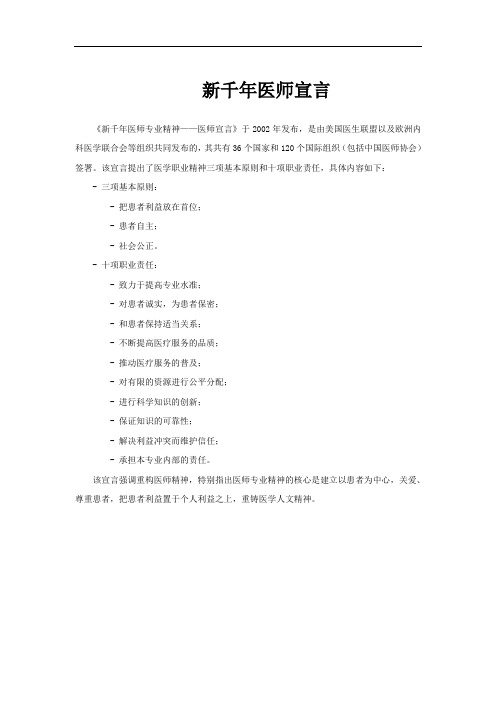
新千年医师宣言
《新千年医师专业精神——医师宣言》于2002年发布,是由美国医生联盟以及欧洲内科医学联合会等组织共同发布的,其共有36个国家和120个国际组织(包括中国医师协会)签署。
该宣言提出了医学职业精神三项基本原则和十项职业责任,具体内容如下:- 三项基本原则:
- 把患者利益放在首位;
- 患者自主;
- 社会公正。
- 十项职业责任:
- 致力于提高专业水准;
- 对患者诚实,为患者保密;
- 和患者保持适当关系;
- 不断提高医疗服务的品质;
- 推动医疗服务的普及;
- 对有限的资源进行公平分配;
- 进行科学知识的创新;
- 保证知识的可靠性;
- 解决利益冲突而维护信任;
- 承担本专业内部的责任。
该宣言强调重构医师精神,特别指出医师专业精神的核心是建立以患者为中心,关爱、尊重患者,把患者利益置于个人利益之上,重铸医学人文精神。
新世纪的医师职业精神—医师宣言
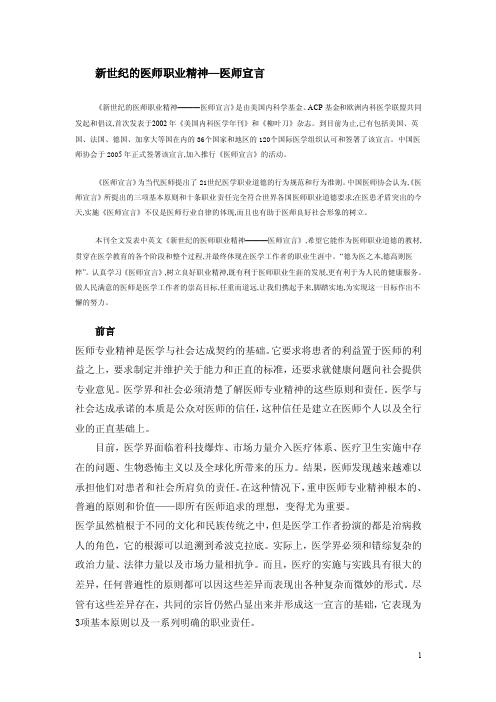
新世纪的医师职业精神—医师宣言《新世纪的医师职业精神———医师宣言》是由美国内科学基金、ACP基金和欧洲内科医学联盟共同发起和倡议,首次发表于2002年《美国内科医学年刊》和《柳叶刀》杂志。
到目前为止,已有包括美国、英国、法国、德国、加拿大等国在内的36个国家和地区的120个国际医学组织认可和签署了该宣言。
中国医师协会于2005年正式签署该宣言,加入推行《医师宣言》的活动。
《医师宣言》为当代医师提出了21世纪医学职业道德的行为规范和行为准则。
中国医师协会认为,《医师宣言》所提出的三项基本原则和十条职业责任完全符合世界各国医师职业道德要求;在医患矛盾突出的今天,实施《医师宣言》不仅是医师行业自律的体现,而且也有助于医师良好社会形象的树立。
本刊全文发表中英文《新世纪的医师职业精神———医师宣言》,希望它能作为医师职业道德的教材,贯穿在医学教育的各个阶段和整个过程,并最终体现在医学工作者的职业生涯中。
“德为医之本,德高则医粹”。
认真学习《医师宣言》,树立良好职业精神,既有利于医师职业生涯的发展,更有利于为人民的健康服务。
做人民满意的医师是医学工作者的崇高目标,任重而道远,让我们携起手来,脚踏实地,为实现这一目标作出不懈的努力。
前言医师专业精神是医学与社会达成契约的基础。
它要求将患者的利益置于医师的利益之上,要求制定并维护关于能力和正直的标准,还要求就健康问题向社会提供专业意见。
医学界和社会必须清楚了解医师专业精神的这些原则和责任。
医学与社会达成承诺的本质是公众对医师的信任,这种信任是建立在医师个人以及全行业的正直基础上。
目前,医学界面临着科技爆炸、市场力量介入医疗体系、医疗卫生实施中存在的问题、生物恐怖主义以及全球化所带来的压力。
中国医生誓词

《中国医师宣言》我庄严宣誓:自觉维护医学的尊严和神圣,敬佑生命,平等仁爱,患者至上,真诚守信,精进审慎,廉洁公正,终身学习,努力担当增进人类健康的崇高职责。
以上誓言,谨记于心,见于行动。
核心精神健康是人全面发展的基础。
作为健康的守护者,医师应遵循病人利益至上的基本原则,弘扬人道主义的职业精神,恪守预防为主和救死扶伤的社会责任。
我们应以平等仁爱、患者至上、真诚守信、精进审慎、廉洁公正、终身学习的中国医师宣言核心精神,自觉维护医学职业的真诚、高尚与荣耀,努力担当社会赋予的增进人类健康的崇高职责。
为此,我们承诺:1、平等仁爱。
坚守医乃仁术的宗旨和济世救人的使命。
关爱患者,无论患者民族、性别、贫富、宗教信仰和社会地位如何,一视同仁。
2、患者至上。
尊重患者的权利,维护患者的利益。
尊重患者及其家属在充分知情条件下对诊疗决策的决定权。
3、真诚守信。
诚实正直,实事求是,敢于担当救治风险。
有效沟通,使患者知晓医疗风险,不因其他因素隐瞒或诱导患者,保守患者私密。
4、精进审慎。
积极创新,探索促进健康与防治疾病的理论和方法。
宽厚包容,博采众长,发扬协作与团队精神。
严格遵循临床诊疗规范,审慎行医,避免疏忽和草率。
5、廉洁公正。
保持清正廉洁,勿用非礼之心,不取不义之财。
正确处理各种利益关系,努力消除不利于医疗公平的各种障碍。
充分利用有限的医疗资源,为患者提供有效适宜的医疗保健服务。
6、终生学习。
持续追踪现代医学进展,不断更新医学知识和理念,努力提高医疗质量。
保证医学知识的科学性和医疗技术应用的合理性,反对伪科学,积极向社会传播正确的健康知识。
守护健康、促进和谐,是中国医师担负的神圣使命。
我们不仅收获职业的成功,还将收获职业的幸福。
我们坚信,我们的承诺将铸就医学职业的崇高与至善,确保人类的尊严与安康。
医师誓言宣誓词

医师誓言宣誓词
作为一名医师,我郑重宣誓:
我将以患者的健康为己任,将患者的生命视为至高无上的价值。
我将竭尽全力,为患者提供最优质的医疗服务,尽我所能地缓解他们的痛苦和病痛。
我将始终尊重患者的尊严和隐私,保护他们的个人信息不受侵犯。
我将尽职尽责,不将患者的信息泄露给任何非授权人士。
我将恪守医德,不分种族、国籍、性别、宗教或社会地位,公正对待每一位患者。
我将尊重患者的自主权,与他们充分沟通,共同制定治疗方案。
我将持续学习和提升自己的专业知识和技能,与时俱进。
我将积极参与医学研究,为医学进步贡献自己的力量。
我将与团队合作,共同为患者的健康努力。
我将尊重和信任我的同事,与他们携手合作,共同解决医疗难题,提供最佳的医疗服务。
我将遵循医学伦理准则,严格遵守行业规范。
我将保持良好的职业道德,不利用职权谋取私利,不参与任何形式的腐败和贪污。
我将尽我所能,为改善公共卫生和推动社会医疗进步做出贡献。
我将积极参与社区活动,教育患者和公众,提高健康意识和保健知识。
我将时刻谨记医师的使命和责任,将患者的健康和福祉置于首位。
我将以真诚和爱心对待每一位患者,尽我所能地帮助他们恢复健康。
这是我的医师誓言,我将始终信守。
无论困难和挑战如何,我将永远坚守这份誓言,为患者的健康而努力。
- 1、下载文档前请自行甄别文档内容的完整性,平台不提供额外的编辑、内容补充、找答案等附加服务。
- 2、"仅部分预览"的文档,不可在线预览部分如存在完整性等问题,可反馈申请退款(可完整预览的文档不适用该条件!)。
- 3、如文档侵犯您的权益,请联系客服反馈,我们会尽快为您处理(人工客服工作时间:9:00-18:30)。
新世纪的医师职业精神—医师宣言《新世纪的医师职业精神———医师宣言》是由美国内科学基金、ACP基金和欧洲内科医学联盟共同发起和倡议,首次发表于2002年《美国内科医学年刊》和《柳叶刀》杂志。
到目前为止,已有包括美国、英国、法国、德国、加拿大等国在内的36个国家和地区的120个国际医学组织认可和签署了该宣言。
中国医师协会于2005年正式签署该宣言,加入推行《医师宣言》的活动。
《医师宣言》为当代医师提出了21世纪医学职业道德的行为规范和行为准则。
中国医师协会认为,《医师宣言》所提出的三项基本原则和十条职业责任完全符合世界各国医师职业道德要求;在医患矛盾突出的今天,实施《医师宣言》不仅是医师行业自律的体现,而且也有助于医师良好社会形象的树立。
本刊全文发表中英文《新世纪的医师职业精神———医师宣言》,希望它能作为医师职业道德的教材,贯穿在医学教育的各个阶段和整个过程,并最终体现在医学工作者的职业生涯中。
“德为医之本,德高则医粹”。
认真学习《医师宣言》,树立良好职业精神,既有利于医师职业生涯的发展,更有利于为人民的健康服务。
做人民满意的医师是医学工作者的崇高目标,任重而道远,让我们携起手来,脚踏实地,为实现这一目标作出不懈的努力。
前言医师专业精神是医学与社会达成契约的基础。
它要求将患者的利益置于医师的利益之上,要求制定并维护关于能力和正直的标准,还要求就健康问题向社会提供专业意见。
医学界和社会必须清楚了解医师专业精神的这些原则和责任。
医学与社会达成承诺的本质是公众对医师的信任,这种信任是建立在医师个人以及全行业的正直基础上。
目前,医学界面临着科技爆炸、市场力量介入医疗体系、医疗卫生实施中存在的问题、生物恐怖主义以及全球化所带来的压力。
结果,医师发现越来越难以承担他们对患者和社会所肩负的责任。
在这种情况下,重申医师专业精神根本的、普遍的原则和价值——即所有医师追求的理想,变得尤为重要。
医学虽然植根于不同的文化和民族传统之中,但是医学工作者扮演的都是治病救人的角色,它的根源可以追溯到希波克拉底。
实际上,医学界必须和错综复杂的政治力量、法律力量以及市场力量相抗争。
而且,医疗的实施与实践具有很大的差异,任何普遍性的原则都可以因这些差异而表现出各种复杂而微妙的形式。
尽管有这些差异存在,共同的宗旨仍然凸显出来并形成这一宣言的基础,它表现为3项基本原则以及一系列明确的职业责任。
基本原则1、将患者利益放在首位的原则。
这一原则是建立在为患者利益服务的基础上。
信任是医患关系的核心,而利他主义是这种信任的基础。
市场力量、社会压力以及管理的迫切需要都绝不能影响这一原则。
2、患者自主的原则。
医师必须尊重患者的自主权。
医师必须诚实地对待患者并使患者在了解病情的基础上有权对将要接受的治疗做出决定。
只要这些决定和伦理规范相符合,并且不会导致要求给予不恰当的治疗,那么患者的这种决定就极为重要。
3、社会公平原则。
医学界必须在医疗卫生体系中促进公平,包括医疗卫生资源的公平分配。
医师应该努力去消除医疗卫生中的歧视,无论这种歧视是以民族、性别、社会经济条件、种族、宗教还是其它的社会分类为基础。
职业责任1、提高业务能力的责任。
医师必须终生学习并且有责任不断更新保证医疗质量所必需的医学知识、临床技巧和团队精神。
更广泛地说,医学界作为一个集体,必需努力保证每一位成员都富有能力,而且有恰当的机制使医师能够达到这一目标。
2、对患者诚实的责任。
医师必须保证在患者同意治疗之前以及治疗之后将病情完整而诚实地告诉他们。
这一期望并非意味着患者应该参与到非常具体的医疗方案中去,而是指他们必须有权利对治疗做出决定。
同时,医师也应该承认由于医疗而受到伤害时,应该立即将情况告知患者,因为不这样做将严重危害患者和社会对医师的信任。
报告和分析医疗差错,为制定恰当的预防措施和改进措施提供了基础,并且也为受到伤害的患者提供恰当的补偿提供了基础。
3、为患者保密的责任。
为了赢得患者的信任和信心,当提及患者的有关情况时需要有恰当的保密措施。
当不可能获得患者自己的同意时,这一责任可以通过和代表患者的有关人员进行商谈来解决。
由于汇集患者资料的电子信息系统的广泛应用以及遗传信息越来越容易获得,现在履行保密的责任比以往都更为迫切。
但是,医师也认识到他们为患者保密的责任,偶尔也必须服从于公众利益的更高需要(比如当患者危及其他人时)。
4、和患者保持适当关系的责任。
由于患者固有的弱势和依赖性,医师和患者之间的某些关系必须避免。
特别值得强调的是,医师绝不应该利用患者获取任何方面的利益,包括个人经济利益或其它的个人目的。
5、提高医疗质量的责任。
医师必须为不断提高医疗卫生质量而努力奉献。
这一责任不仅要求医师保持他们的临床技能,而且要求医师和其他专业人员通过合作减少医疗差错,提高患者的安全性,减少医疗卫生资源的过度使用以及优化医疗结果。
医师必须积极参与建立更好的医疗质量衡量办法,并应用这些办法去常规评价所有参与医疗卫生实践的个人、机构和体系的工作。
医师个人或他们的专业组织必须对帮助建立并实施这—机制负有责任,其目的是为了医疗质量的进一步提高。
6、促进享有医疗的责任。
医师专业精神要求所有医疗卫生体系的目标是提供统一的、充分的医疗标准。
作为个人以及作为整体,医师必须努力减少阻碍公平的医疗保健的障碍。
在各种体系中,医师应该努力去消除那些基于教育、法律、财务、地域以及社会歧视的障碍。
对公平负有责任而不考虑医师或行业的私利,不仅使公共卫生和预防医学得以提高,而且每个医师也因此而得到公众的拥护。
7、对有限的资源进行公平分配的责任。
当满足患者个人的需要时,医师必须明智而有效地利用有限的临床资源为患者提供卫生保健。
他们有责任和其他医师、医院以及医疗保健的付费方共同制定高效低耗的医疗保健指南。
医师对合理分配资源所负有的职业责任要求他们谨慎小心地避免多余的检查和操作。
提供不必要的服务不仅使患者可能受到本可避免的伤害,增加患者不必要的费用,而且减少了其他患者可以获得的资源。
8、对科学知识负有责任。
医学与社会之间的关系绝大部分是以完整而合理地应用科学知识与技术为基础的。
医师有义务赞同科学的标准、促进研究、创新知识并保证知识的合理应用。
医学界对知识的完整性负有责任,而这种完整性则是以科学证据和医师经验为基础的。
9、通过解决利益冲突而维护信任的责任。
医学工作者和他们的组织有许多机会因追求私利或个人的好处而危害他们的职业责任。
当追求与营利性的产业相关时,包括医疗设备生产厂商、保险公司和医药公司,这种危害尤其严重。
医师有责任认识、向大众揭发并处理责任范围内或工作中产生的利益冲突。
产业和专业领导之间的关系应该予以公开,尤其当后者为制定临床试验标准、撰写社论或治疗指南者,或担任科学杂志的编辑。
10、对职责负有责任。
作为医师职业的成员,医师应该为最大限度地提高医疗水平而通力合作、互相尊重并参与自律,这包括对没有达到职业标准的成员给予纠正并为此制定标准。
无论作为个人还是作为集体,医师有义务参加这些活动。
这些义务活动包括参与内部评审并从专业工作的各个方面接受外界的检查。
总结在所有文化和社会中,现代医学实践都面临着前所未有的挑战。
改变医疗卫生体系与兼顾患者的需求,以及达到这些需求所需的有限资源都越来越多地依赖于市场的作用,其中以放弃将患者利益放在首位与传统职业责任之间的挑战最为突出。
在这个经济迅猛发展的年代,为了维护医学对社会的承诺,我们认为有必要对医师重申医师专业精神的原则,并唤起他们的积极参与。
这不仅要求医师个人对患者负责,而且要求他们作为集体去为社会的利益而努力,进而促进医疗卫生体系的改进。
医师专业精神宣言的目的在于鼓励医师参与这项活动,并促进医学界制定一个统一的行动计划来达成这些责任。
Medical professionalism in the new millennium: a physicians' charterPhysicians today are experiencing frustration as changes in the healthcare delivery systems in virtually all industrialised countries threaten the very nature and values of medical professionalism. Meetings among the European Federation of Internal Medicine, the American College of Physicians and American Society of Internal Medicine (ACP-ASIM), and the American Board of Internal Medicine (ABIM) have confirmed that physicians' views on professionalism are similar in quite diverse systems of healthcare delivery. We share the view that medicine's commitment to the patient is being challenged by external forces of change within our societies.Recently, voices from many countries have begun calling for a renewed sense of professionalism, one that is activist in reforming healthcare systems. Responding to this challenge, the European Federation of Internal Medicine, the ACP-ASIM Foundation, and the ABIM Foundation combined efforts to launch the Medical Professionalism Project (<>) in late 1999. These three organisations designated members to develop a "charter" to encompass a set of principles to which all medical professionals can and should aspire. The charter supports physicians' efforts to ensure that thehealthcare systems and the physicians working within them remain committed both to patients' welfare and to the basic tenets of social justice. Moreover, the charter is intended to be applicable to different cultures and political systems.PreambleProfessionalism is the basis of medicine's contract with society. It demands placing the interests of patients above those of the physician, setting and maintaining standards of competence and integrity, and providing expert advice to society on matters of health. The principles and responsibilities of medical professionalism must be clearly understood by both the profession and society. Essential to this contract is public trust in physicians, which depends on the integrity of both individual physicians and the whole profession.At present, the medical profession is confronted by an explosion of technology, changing market forces, problems in healthcare delivery, bioterrorism, and globalisation. As a result, physicians find it increasingly difficult to meet their responsibilities to patients and society. In these circumstances, reaffirming the fundamental and universal principles and values of medical professionalism, which remain ideals to be pursued by all physicians, becomes all the more important.The medical profession everywhere is embedded in diverse cultures and national traditions, but its members share the role of healer, which has roots extending back to Hippocrates. Indeed, the medical profession must contend with complicated political, legal, and market forces. Moreover, there are wide variations in medical delivery and practice through which any general principles may be expressed in both complex and subtle ways. Despite these differences, common themes emerge and form the basis of this charter in the form of three fundamental principles and as a set of definitive professional responsibilities.Fundamental principlesPrinciple of primacy of patients' welfareThis principle is based on a dedication to serving the interest of the patient. Altruism contributes to the trust that is central to the physician–patient relationship. Market forces, societal pressures, and administrative exigencies must not compromise this principle.Principle of patients' autonomyPhysicians must have respect for patients' autonomy. Physicians must be honest with their patients and empower them to make informed decisions about their treatment. Patients' decisions about theircare must be paramount, as long as those decisions are in keeping with ethical practice and do not lead to demands for inappropriate care.Principle of social justiceThe medical profession must promote justice in the healthcare system, including the fair distribution of healthcare resources. Physicians should work actively to eliminate discrimination in healthcare, whether based on race, gender, socioeconomic status, ethnicity, religion, or any other social category.A set of professional responsibilitiesCommitment to professional competencePhysicians must be committed to lifelong learning and be responsible for maintaining the medical knowledge and clinical and team skills necessary for the provision of quality care. More broadly, the profession as a whole must strive to see that all of its members are competent and must ensure that appropriate mechanisms are available for physicians to accomplish this goal.Commitment to honesty with patientsPhysicians must ensure that patients are completely and honestly informed before the patient has consented to treatment and after treatment has occurred. This expectation does not mean that patients should be involved in every minute decision about medical care; rather, they must be empowered to decide on the course of therapy. Physicians should also acknowledge that, in healthcare, medical errors that injure patients do sometimes occur. Whenever patients are injured as a consequence of medical care, patients should be informed promptly because failure to do so seriously compromises patients' and societal trust. Reporting and analysing medical mistakes provides the basis for appropriate prevention and improvement strategies and for appropriate compensation to injured parties.Commitment to patients' confidentialityEarning the trust and confidence of patients requires that appropriate confidentiality safeguards be applied to disclosure of patients' information. This commitment extends to discussions with people acting on a patient's behalf when obtaining the patient's own consent is not feasible. Fulfilling the commitment to confidentiality is more pressing now than ever before, given the widespread use of electronic information systems for compiling data on patients and an increasing availability of genetic information. Physicians recognise, however, that their commitment to confidentiality must occasionally yield to over-riding considerations in the public interest (for example, when patients endanger others).Commitment to maintaining appropriate relationships with patientsGiven the inherent vulnerability and dependency of patients, certain relationships between physicians and patients must be avoided. In particular, physicians should never exploit patients for any sexual advantage, personal financial gain, or other private purpose.Commitment to improving quality of carePhysicians must be dedicated to continuous improvement in the quality of healthcare. This commitment entails not only maintaining clinical competence but also working collaboratively with other professionals to reduce medical error, increase patients' safety, minimise overuse of healthcare resources, and optimise the outcomes of care. Physicians must actively participate in the development of better measures of quality of care and the application of quality measures to assess routinely the performance of all individuals, institutions, and systems responsible for healthcare delivery. Physicians, both individually and through their professional associations, must take responsibility for assisting in the creation and implementation of mechanisms designed to encourage continuous improvement in the quality of care.Commitment to improving access to careMedical professionalism demands that the objective of all healthcare systems be the availability of a uniform and adequate standard of care. Physicians must individually and collectively strive to reduce barriers to equitable healthcare. Within each system, the physician should work to eliminate barriers to access based on education, laws, finances, geography, and social discrimination. A commitment to equity entails the promotion of public health and preventive medicine, as well as public advocacy on the part of each physician, without concern for the self-interest of the physician or the profession.Commitment to a just distribution of finite resourcesWhile meeting the needs of individual patients, physicians are required to provide healthcare that is based on the wise and cost-effective management of limited clinical resources. They should be committed to working with other physicians, hospitals, and payers to develop guidelines for cost-effective care. The physician's professional responsibility for appropriate allocation of resources requires scrupulous avoidance of superfluous tests and procedures. The provision of unnecessary services not only exposes patients to avoidable harm and expense but also diminishes the resources available for others.Commitment to scientific knowledgeMuch of medicine's contract with society is based on the integrity and appropriate use of scientific knowledge and technology. Physicians have a duty to uphold scientific standards, to promote research, and to create new knowledge and ensure its appropriate use. The profession is responsible for the integrity of this knowledge, which is based on scientific evidence and physicians' experience.Commitment to maintaining trust by managing conflicts of interestMedical professionals and their organisations have many opportunities to compromise their professional responsibilities by pursuing private gain or personal advantage. Such compromises are especially threatening in the pursuit of personal or organisational interactions with for-profit industries, including medical equipment manufacturers, insurance companies, and pharmaceutical firms. Physicians have an obligation to recognise, disclose to the general public, and deal with conflicts of interest that arise in the course of their professional duties and activities. Relationships between industry and opinion leaders should be disclosed, especially when the latter determine the criteria for conducting and reporting clinical trials, writing editorials or therapeutic guidelines, or serving as editors of scientific journals.Commitment to professional responsibilitiesAs members of a profession, physicians are expected to work collaboratively to maximise patients' care, be respectful of one another, and participate in the processes of self-regulation, including remediation and discipline of members who have failed to meet professional standards. The profession should also define and organise the educational and standard-setting process for current and future members. Physicians have both individual and collective obligations to participate in these processes. These obligations include engaging in internal assessment and accepting external scrutiny of all aspects of their professional performance.SummaryThe practice of medicine in the modern era is beset with unprecedented challenges in virtually all cultures and societies. These challenges centre on increasing disparities among the legitimate needs of patients, the available resources to meet those needs, the increasing dependence on market forces to transform healthcare systems, and the temptation for physicians to forsake their traditional commitment to the primacy of patients' interests. To maintain the fidelity of medicine's social contract during this turbulent time, we believe that physicians must reaffirm their active dedication to the principles of professionalism, which entails not only their personal commitment to the welfare of their patients but also collective efforts to improve the healthcare system for the welfare of society. This Charter on Medical Professionalism is intended to encourage such dedication and to promote an action agenda for the profession of medicine that is universal in scope and purpose.。
